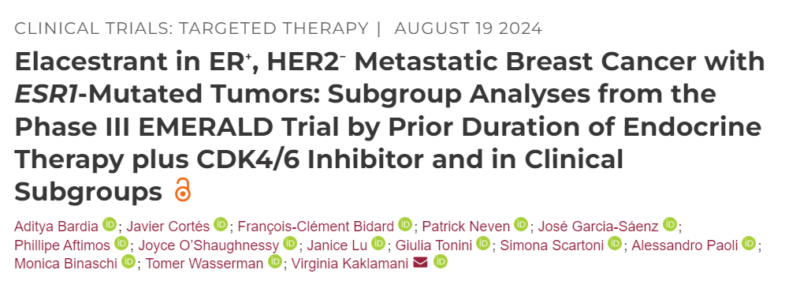Sergio Cifuentes Canabal, Cancer Research Project Manager at CENEIT Mexico, shared on LinkedIn:
“Advancing Treatment for ER+/HER2- mBC: Key Insights on Elacestrant.
Exciting new data from the EMERALD Phase III trial show that Elacestrant offers significant benefits in patients with ER+, HER2- metastatic breast cancer (mBC) harboringESR1 mutations.
For patients who previously received endocrine therapy plus a CDK4/6 inhibitor (CDK4/6i), elacestrant significantly prolonged PFS compared to standard-of-care (SOC) endocrine therapy.
Key Findings:
– In patients with ESR1-mutated tumors and ET+CDK4/6i ≥12 months, median PFS with elacestrant was 8.6 months vs. 1.9 months with SOC.
– Consistent results were observed across subgroups, including those with bone metastases, liver/lung metastases, and various mutations like PIK3CA and TP53.
Safety: was manageable, with no unexpected adverse events, making this a viable option for long-term treatment strategies in these patients.
What does this mean for daily practice?
Incorporating elacestrant into clinical routines could offer a much-needed option for patients whose disease has progressed after extended ET+CDK4/6i treatment. Here are some practical recommendations:
1. Personalized Approach: Prioritize molecular profiling to identify ESR1 mutations early in the course of treatment to select appropriate therapies like elacestrant.
2. Extended Monitoring: Patients who have been on ET+CDK4/6i for ≥12 months should be monitored for disease progression and considered for elacestrant if ESR1 mutations are present.
3. Safety First: While the safety profile is promising, it’s crucial to monitor side effects, particularly in those with advanced metastases, to ensure tolerability and adherence.
This study not only highlights the effectiveness of elacestrant but also underscores the importance of precision oncology in optimizing outcomes for ER+, HER2- mBC patients. Let’s continue pushing the boundaries to offer more personalized and effective treatments to our patients.”



